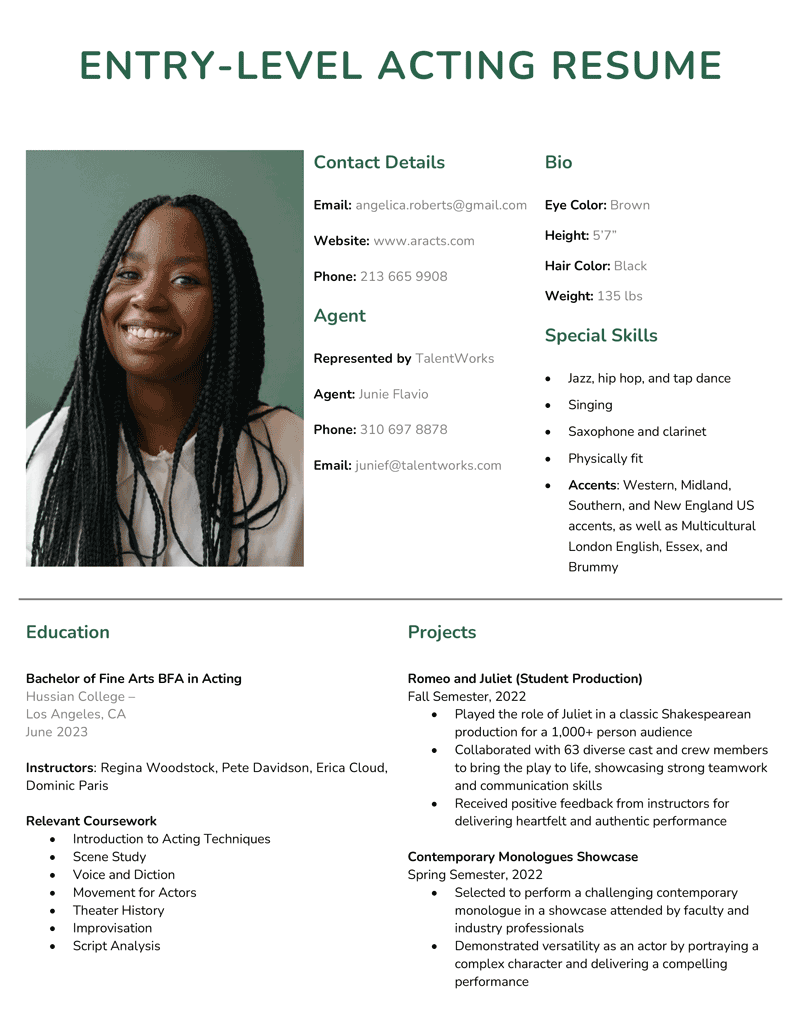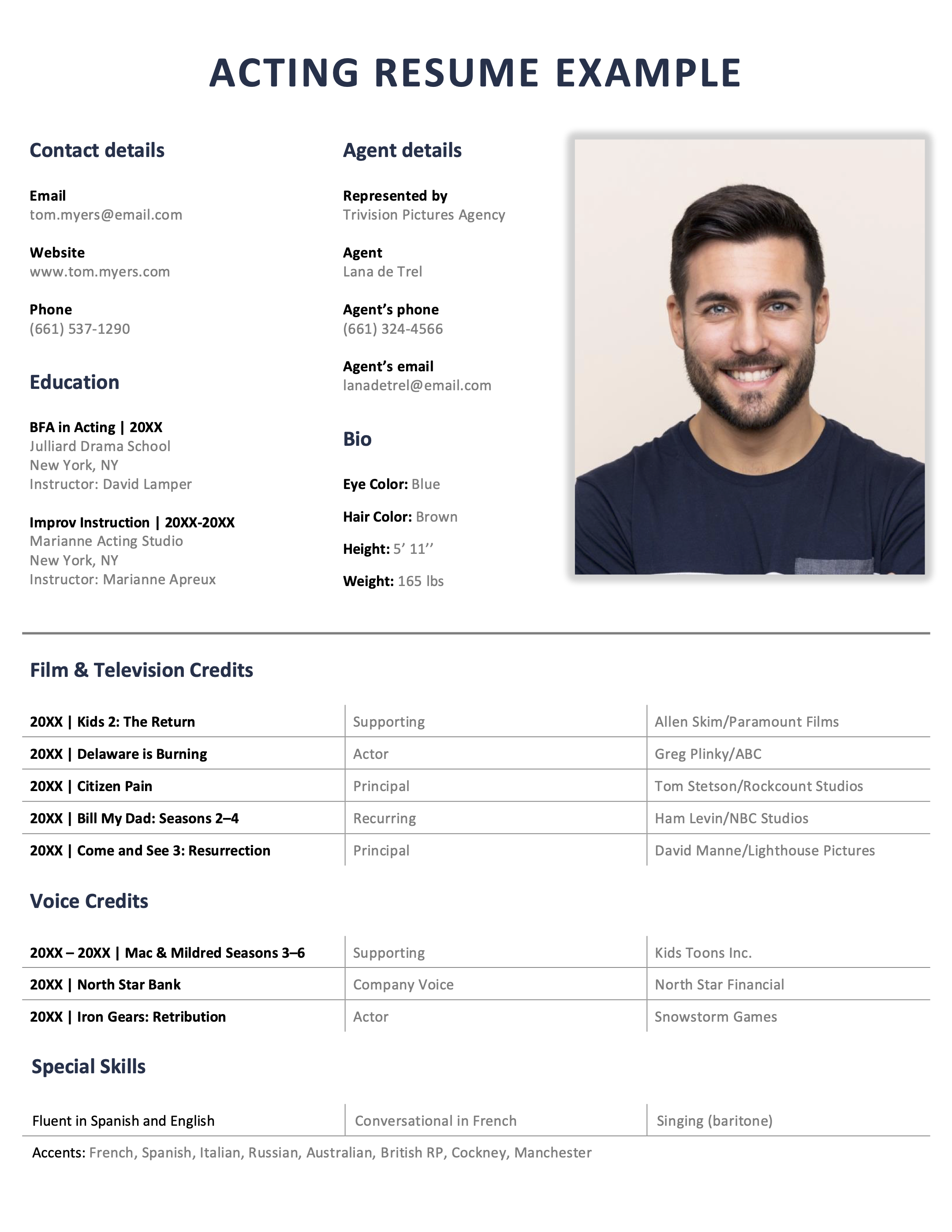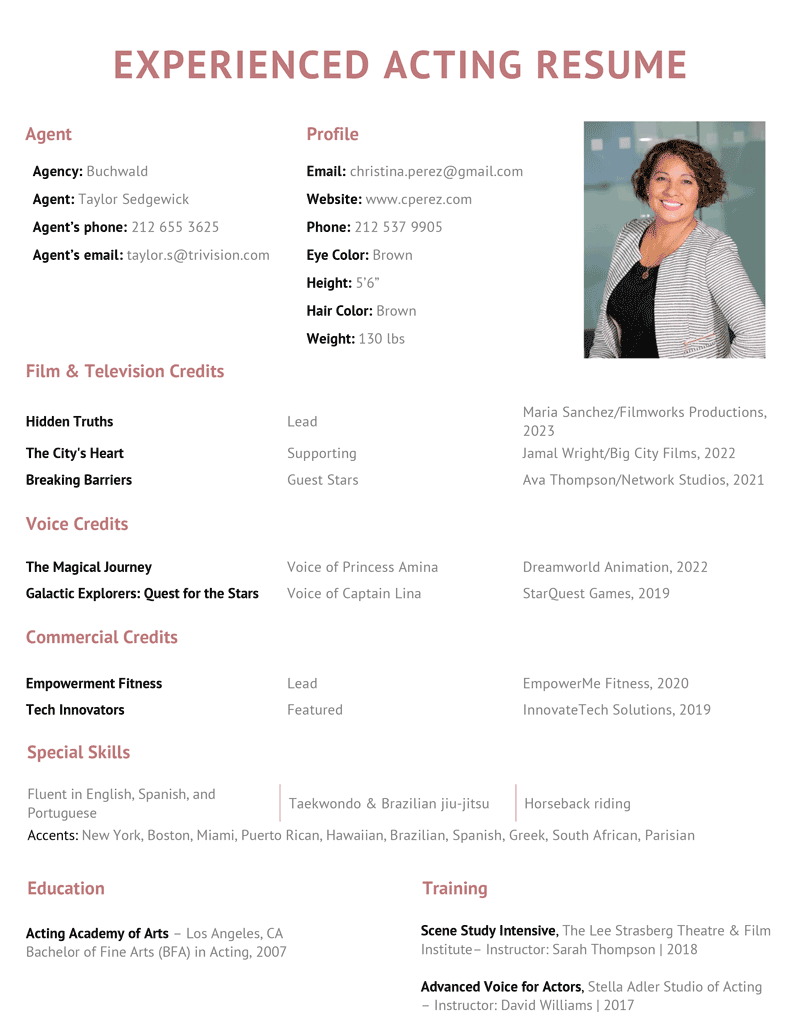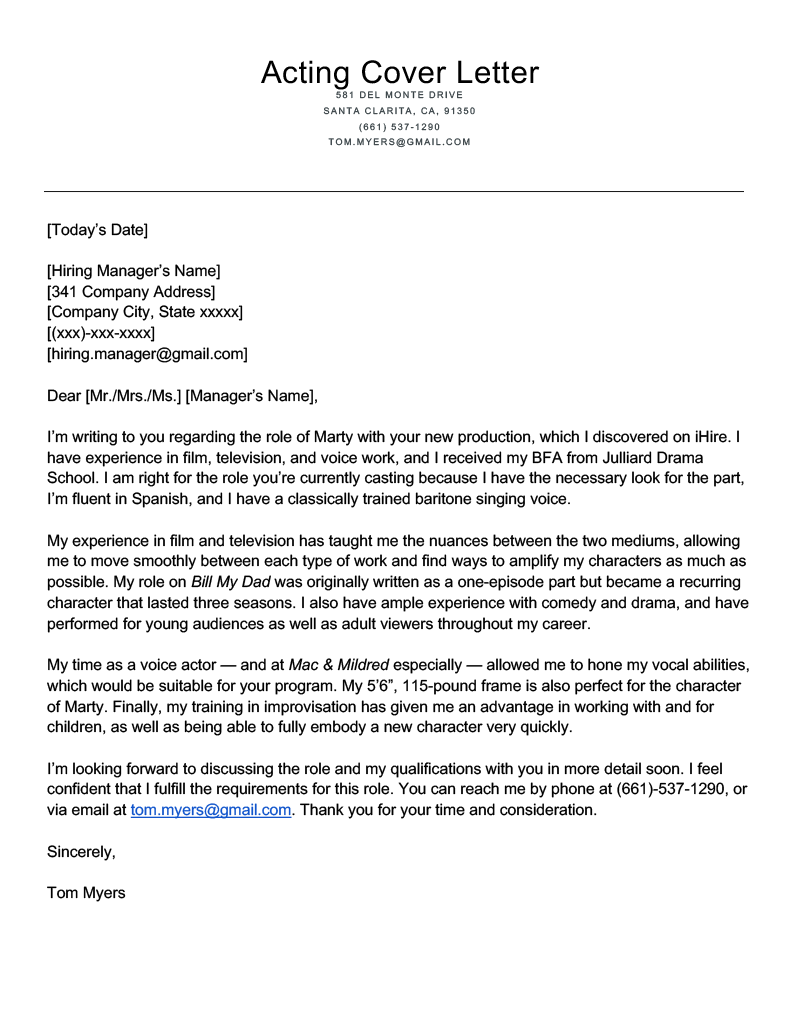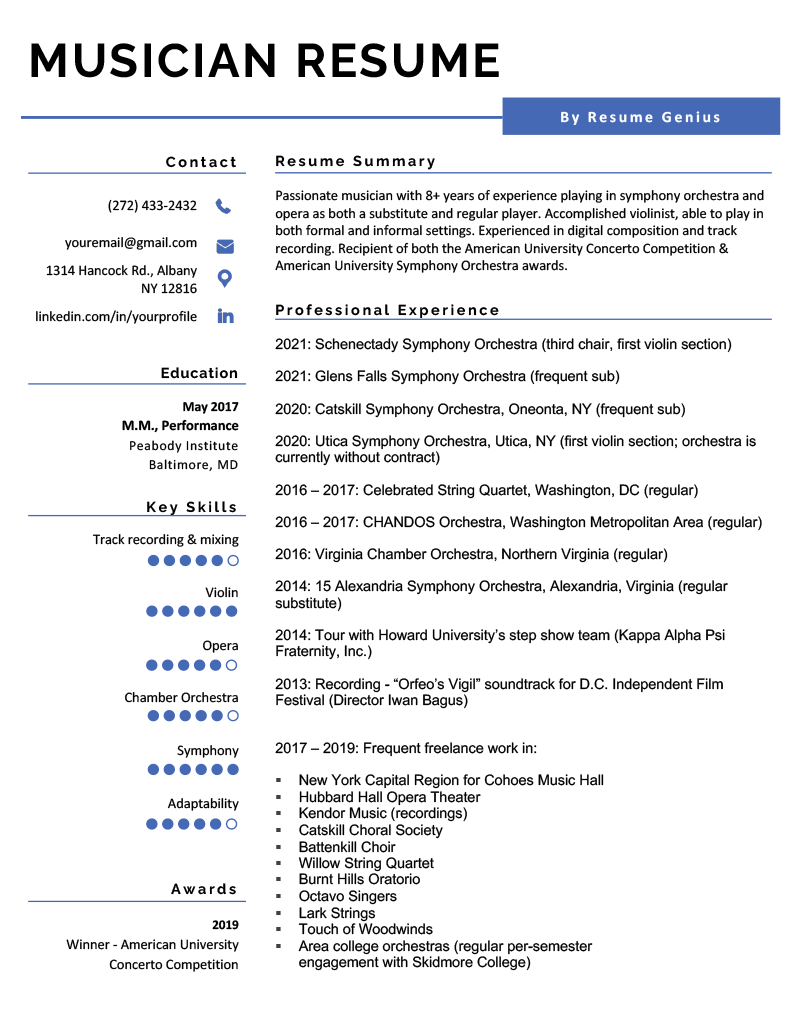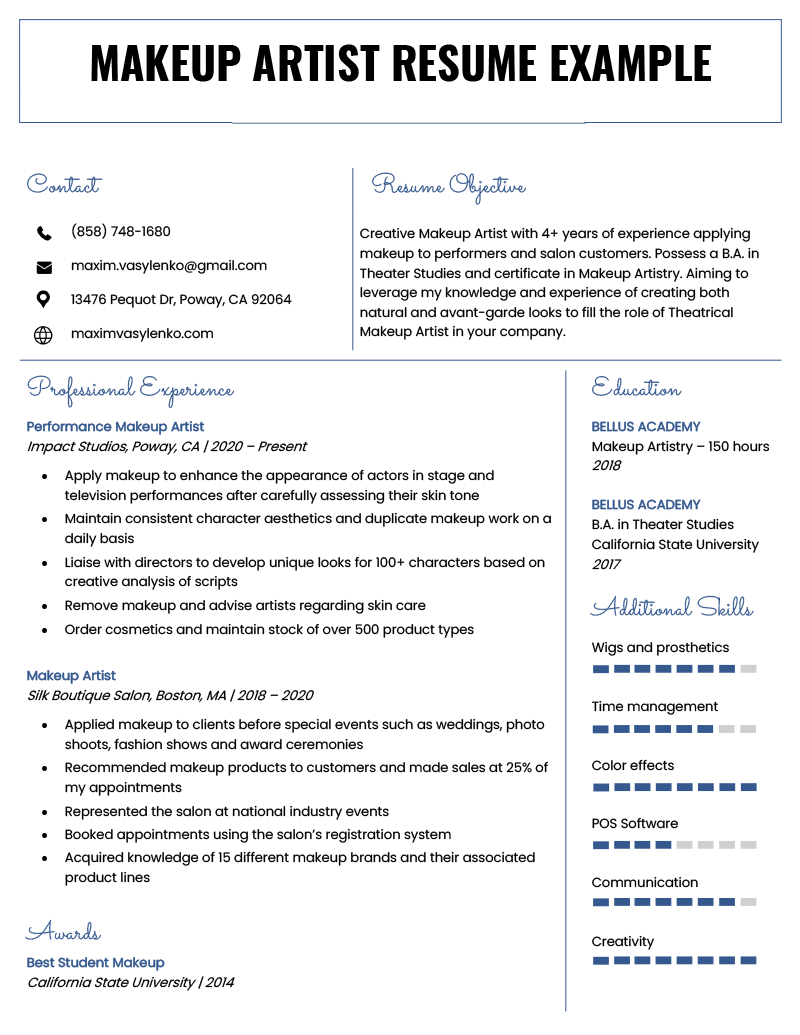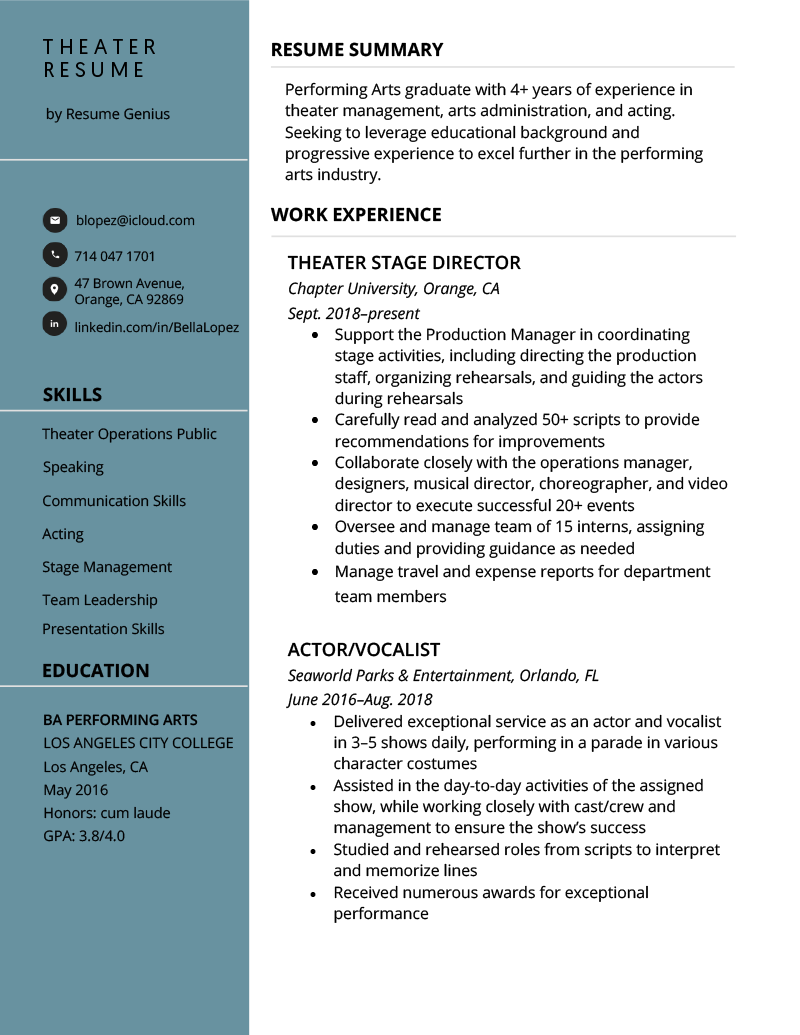Text Format
- Entry-level resume
- Mid-level resume
- Experienced resume
FIRST AND LAST NAME
Email: your.email@email.com
Phone: (123) 456-7891
Address: Street, City, State
LinkedIn: linkedin.com/in/yourprofile
AGENT
Represented by TalentWorks
Agent: Junie Flavio
Phone: 310 697 8878
Email: junief@talentworks.com
BIO
Eye Color: Brown
Height: 5’7”
Hair Color: Black
Weight: 135 lbs
SPECIAL SKILLS
- Jazz, hip hop, and tap dance
- Singing
- Saxophone and clarinet
- Physically fit
- Accents: Western, Midland, Southern, and New England US accents, as well as Multicultural London English, Essex, and Brummy
EDUCATION
Bachelor of Fine Arts BFA in Acting
Hussian College –
Los Angeles, CA
June 2023
Instructors: Regina Woodstock, Pete Davidson, Erica Cloud, Dominic Paris
Relevant Coursework
- Introduction to Acting Techniques
- Scene Study
- Voice and Diction
- Movement for Actors
- Theater History
- Improvisation
- Script Analysis
PROJECTS
- Played the role of Juliet in a classic Shakespearean production for a 1,000+ person audience
- Collaborated with 63 diverse cast and crew members to bring the play to life, showcasing strong teamwork and communication skills
- Received positive feedback from instructors for delivering heartfelt and authentic performance
- Selected to perform a challenging contemporary monologue in a showcase attended by faculty and industry professionals
- Demonstrated versatility as an actor by portraying a complex character and delivering a compelling performance
CONTACT DETAILS
Agent: Lana de Trel
Agent’s phone: 661 324 4566
Agent’s email: lanadetrel@trivision.com
Website: www.tom.myers.com
BIO
Eye Color: Brown
Height: 5’6”
Hair Color: Brown
Weight: 145 lbs
EDUCATION
Julliard Drama School – New York, NY
BFA in Acting
Instructor: David Lamper
Marianne Acting Studio – New York, NY
Improv Instruction
Instructor: Marianne Apreux
FILM & TELEVISION CREDITS
Kids 2: The Return | Supporting | Allen Skim/Paramount Films
Delaware is Burning | Actor | Greg Plinky/ABC
Citizen Pain | Principal | Tom Stetson/Rockcount Studios
Bill My Dad: Seasons 2–4 | Recurring | Ham Levin/NBC Studios
Come and See 3: Resurrection | Principal | David Manne/Lighthouse Pictures
VOICE CREDITS
Mac & Mildred Seasons 3–6 | Supporting | Kids Toons Inc.
North Star Bank | Company Voice | North Star Financial
Iron Gears: Retribution | Actor | TenCents Games
SPECIAL SKILLS
- Fluent in Spanish
- Conversational in French
- Singing (baritone)
- Accents: French, Spanish, Italian, Russian, Cockney, Australian, Northern England
AGENT
Agency: Buchwald
Agent: Taylor Sedgewick
Agent’s phone: 212 655 3625
Agent’s email: taylor.s@trivision.com
PROFILE
Eye Color: Brown
Height: 5’6”
Hair Color: Brown
Weight: 130 lbs
FILM & TELEVISION CREDITS
Hidden Truths – Lead – Maria Sanchez/Filmworks Productions, 2023
The City’s Heart – Supporting – Jamal Wright/Big City Films, 2022
Breaking Barriers – Guest Stars – Ava Thompson/Network Studios, 2021
VOICE CREDITS
The Magical Journey – Voice of Princess Amina – Dreamworld Animation, 2022
Galactic Explorers: Quest for the Stars – Voice of Captain Lina – StarQuest Games, 2019
COMMERCIAL CREDITS
Empowerment Fitness – Lead – EmpowerMe Fitness, 2020
Tech Innovators – Featured – InnovateTech Solutions, 2019
SPECIAL SKILLS
- Fluent in English, Spanish, and Portuguese
- Taekwondo & Brazilian jiu-jitsu
- Horseback riding
- Accents: New York, Boston, Miami, Puerto Rican, Hawaiian, Brazilian, Spanish, Greek, South African, Parisian
EDUCATION
Acting Academy of Arts – Los Angeles, CA, Bachelor of Fine Arts (BFA) in Acting, 2007
TRAINING
Scene Study Intensive, The Lee Strasberg Theatre & Film Institute– Instructor: Sarah Thompson | 2018
Advanced Voice for Actors, Stella Adler Studio of Acting – Instructor: David Williams | 2017


